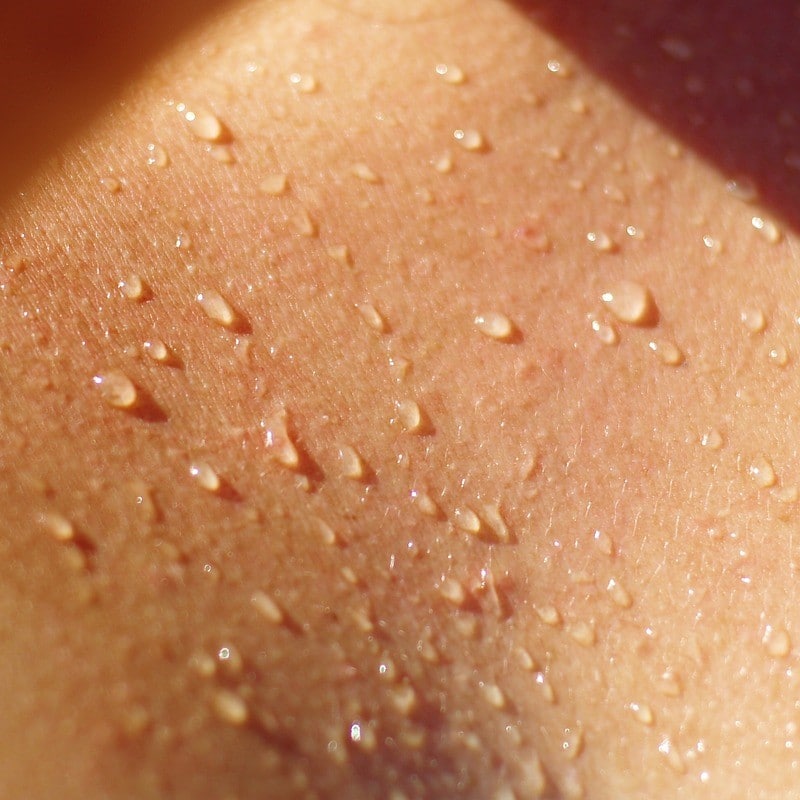
We all sweat – sure, some more than others. And of course, you’ll sweat more when engaging in physical activity. But many people have to live with excessive sweating every day.
While it may not seem like a big deal to those who don’t have a condition like hyperhidrosis, those affected have a different perspective. Do you deal with excessive sweating? This post is for you!
Heavy or excessive sweating, also known as hyperhidrosis, affects 1 in 20 Americans (nearly 15 million people). This condition can affect both men and women but typically starts in childhood or adolescence and most commonly affects a younger population, typically aged 18-39.
What’s Hyperhidrosis?
Excessive sweating can be severe enough to severely impair one’s quality of life. In fact, studies have shown that many of those who suffer from hyperhidrosis say their condition causes limitations in work and social relationships, sports and leisure activities, and ultimately affects emotional health.
Over ¾ of patients with hyperhidrosis have reported that the condition makes them embarrassed and anxious. Now that we’ve gotten an intro into how the condition affects so many people, let’s get clear on what hyperhidrosis is.
Unfortunately, this is one of the medical conditions that many don’t have a good grasp on and will wrongly self-diagnose themselves with. The truth is that people with hyperhidrosis produce four to five times more sweat than the average person in response to heat or stress.
A majority of those with hyperhidrosis have excessive underarm sweating and may also experience issues with other parts of the body too.
Types of Hyperhidrosis or Excessive Sweating
There are two types of Hyperhidrosis: primary and secondary.
Primary Hyperhidrosis
Primary hyperhidrosis is when you sweat excessively without a physical reason. In other words, another medical condition or medication does not cause it. This type mostly begins in childhood or adolescence.
In addition, this type typically affects the underarms, palms, soles, and face. It doesn’t happen while sleeping. It may run in families, and those with parents who have this condition face a 25% chance of developing it too.
Secondary Hyperhidrosis
Secondary hyperhidrosis is a symptom of another medical condition or a side effect of medication. This is typically limited to specific body parts but is often generalized as sweating that occurs over the entire body. It may happen during waking and sleeping hours.
Whether you’re dealing with primary or secondary hyperhidrosis or you’re not even sure if you have hyperhidrosis, pinpointing the root cause of your medical concern is the first step.
At Evexias Medical Centers in Denver, our team can provide a comprehensive consultation. We can help you determine what’s causing your issues. Contact us now if you’re ready to start dealing with it and regain some peace of mind. Otherwise, read on and learn how we can help you sort it out.
If your medical advisors diagnose you with hyperhidrosis, you have options!
In other words, you don’t have to sit back and let excessive sweating take control of your life. You can ask us about personalized approaches to combat hyperhidrosis.
Treating Your Hyperhidrosis (Excessive Sweating)
When considering how to treat your excessive sweating condition best, you may have thought pills or creams would be necessary. However, over the last decade, many doctors have actually found Botox to be a successful solution.
If you’ve tried different drugs or researched strong antiperspirants with no luck, why not consider botulinum toxin A (Botox)? Yep – the stuff that’s widely used to tackle wrinkles and erase signs of aging can actually be effective in putting a halt to excessive sweating!
It’s so effective the FDA approved Botox to be used for the treatment of hyperhidrosis back in 2004! Botox injections use the botulinum toxin to block nerve signals that are responsible for sweating and can stop the sweat glands from producing too much sweat.
Typically, patients will need injections every four to six months, depending on the severity of the condition due to nerve regeneration. However, over time, you’ll be able to go for longer periods without needing more injections.
Consult Your Doctor
Remember how we mentioned there were two types of hyperhidrosis? If you believe you may have secondary hyperhidrosis, you should speak with your doctor about pinpointing the true cause of your condition.
Sweating is normal, but you don’t have to live with excessive sweating. Ready to learn more about Botox injections for hyperhidrosis? Schedule your consultation now!
